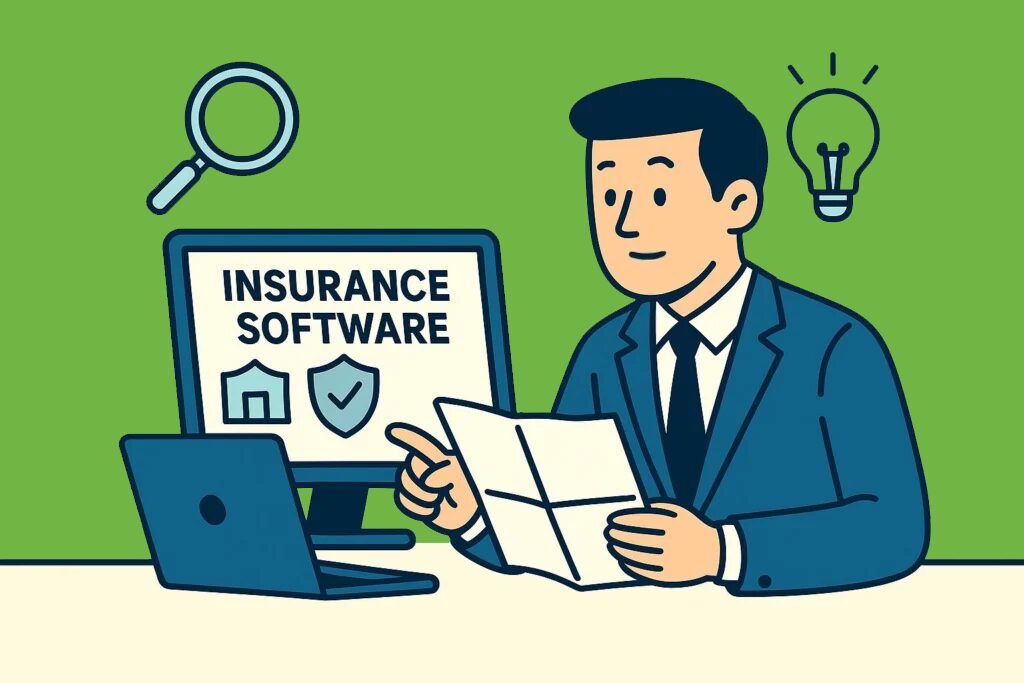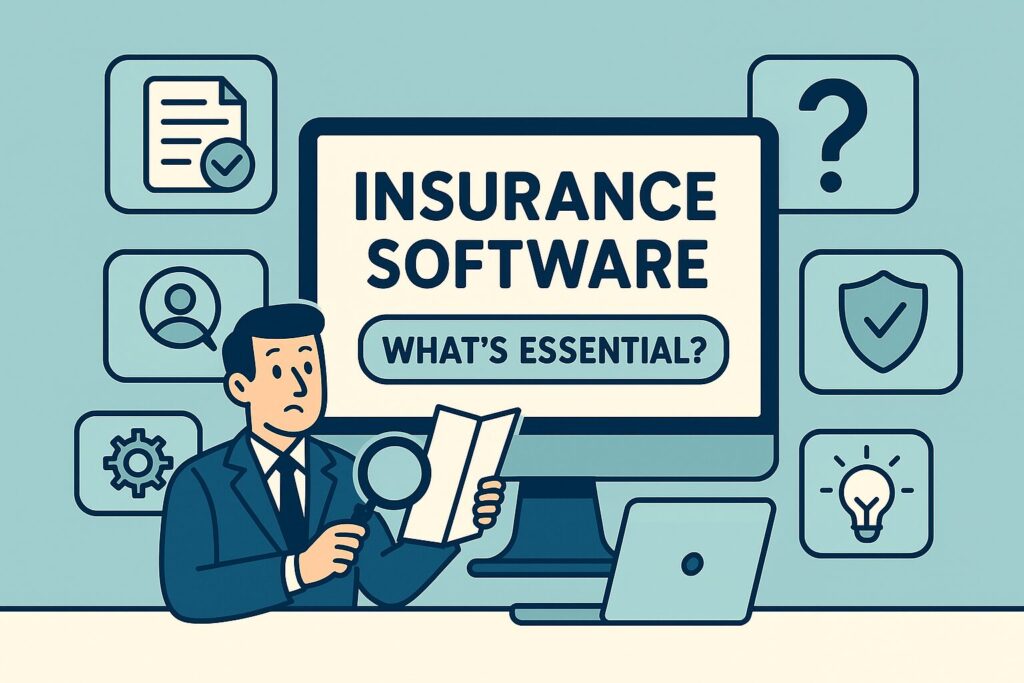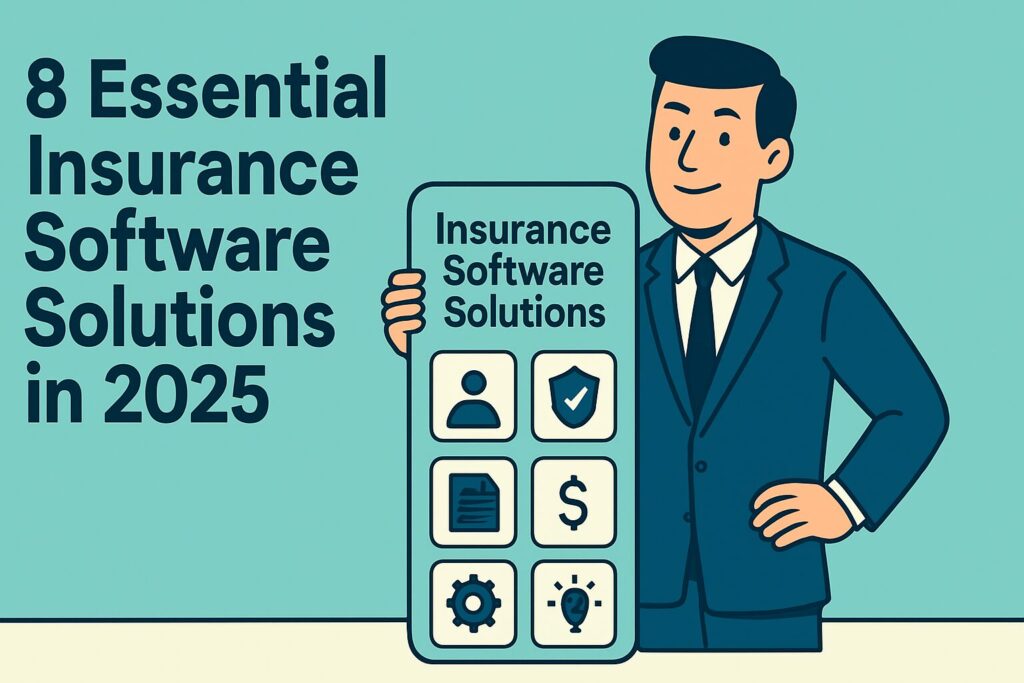What to Look for in Insurance Agency Solutions

The insurance industry has seen major digital shifts recently, with cutting-edge insurance agency management systems becoming a key advantage for successful firms. As we move through 2025, agencies using robust insurance agency management software are gaining a significant edge over rivals that are still stuck with outdated systems or manual processes. Digital solutions for insurance agencies now functions as the backbone for streamlined operations, better client experiences, and improved profitability. Solutions like EZLynx have grown increasingly popular, offering comprehensive features tailored specifically for the industry.
This guide walks you through the most important categories of insurance software for agents, recommendations for specific tools that deliver real results, outlines how to pick the right solutions for your specific needs, and answers common questions about technology implementation in your agency.
The ROI and Value of Insurance Software

When considering any business investment, the fundamental question remains: “What’s the return?” For insurance agency management software, the ROI shows up in multiple, measurable ways that directly impact your bottom line and operational efficiency.
At our partner agency, implementing a comprehensive insurance management system cut administrative workload by 32% in just six months. Staff who previously spent hours on data entry and policy updates redirected that time toward building client relationships and sales activities, resulting in a 27% increase in policy renewals.
Beyond immediate efficiency gains, investing in quality insurance software for brokers delivers lasting advantages:
- Reduced errors and omissions exposure: Automated workflows and integrated data validation significantly decrease the risk of costly mistakes in policy documentation and client communications.
- Enhanced scalability: Insurance broker software solutions allow agencies to grow without proportionally increasing administrative staff, maintaining profit margins during expansion.
- Improved employee satisfaction: By eliminating tedious and manual tasks, staff can focus on more rewarding aspects of their roles, reducing turnover and training costs.
- Competitive differentiation: Clients increasingly expect digital convenience, and agencies with modern software solutions stand out against less tech-savvy competitors.
- Data-driven decision making: Advanced analytics provide insights into business performance, client needs, and market trends that inform strategic decisions.
The most compelling aspect of modern insurance agency management systems is their ability to transform previously isolated operations into an integrated ecosystem. Once integrated, information then flows seamlessly between functions, creating a multiplier effect on productivity.
Common Types of Insurance Software - What's Essential?

To build an effective technology stack, insurance agencies need to understand the core categories of software that address specific operational needs. Here’s a breakdown of the essential types of insurance company software solutions that every organization should consider:
Insurance software for Training & Compliance Platforms
These specialized platforms ensure consistent onboarding experiences for new hires while maintaining regulatory compliance across the agency. They typically include structured learning paths, assessment tools, and documentation features that standardize knowledge transfer and reduce the burden on senior staff members who would otherwise deliver training manually.
Training platforms are particularly valuable for agencies experiencing growth or high turnover, as they preserve institutional knowledge and ensure clients receive consistent service regardless of which team member they interact with.
Insurance software for Hiring Platforms
Finding qualified insurance professionals remains a significant challenge for many agencies. Specialized hiring platforms streamline the recruitment process by connecting agencies with pre-vetted candidates who possess industry-specific qualifications. These systems often include skill assessment capabilities, personality matching, and integration with background verification services.
The right hiring platform can reduce time-to-fill for critical positions and improve retention by ensuring better alignment between candidates and agency culture from the start.
Insurance software for Agency Management Systems (AMS)
The AMS functions as the operational command center for insurance agencies, centralizing client information, policy details, claims data, and workflow management. Modern insurance agency management systems offer robust document management, automated renewal notifications, commission tracking, and integration with carrier systems.
An effective AMS eliminates duplicate data entry, provides consistent access to client information across departments, and automates routine administrative tasks that would otherwise consume valuable staff time.
Insurance software for Customer Relationship Management (CRM)
While there’s some overlap with AMS functionality, dedicated insurance CRM systems focus specifically on relationship building, sales pipeline management, and marketing automation. They help agencies track prospect interactions, schedule follow-ups, and identify cross-selling and upselling opportunities within the existing client base.
CRM systems are especially valuable for agencies looking to grow, as they provide structure to business development activities and ensure potential clients don’t fall through the cracks during the nurturing process.
Insurance software for Lead Generation & Marketing Automation
These platforms help agencies attract new prospects through digital channels, nurture leads with targeted content, and convert opportunities more efficiently. Capabilities typically include website optimization, email marketing, social media scheduling, and performance analytics.
Marketing automation reduces the manual effort involved in maintaining client communication, allowing agencies to stay top-of-mind with prospects and existing clients through personalized, relevant messaging at scale.
Insurance software for Quote & Proposal Insurance Software Tools
Specialized quoting software streamlines the process of generating accurate, professional-looking proposals for prospects and existing clients. These tools typically integrate with carrier systems to pull real-time rates and coverage options, allowing agents to quickly compare options and present them in client-friendly formats.
The best quoting tools enhance the client experience while saving significant time for producers who would otherwise need to manually compile information from multiple sources.
Insurance software for Claims Management Systems
While many agencies rely on carrier systems for claims processing, dedicated claims management software provides a centralized view of all client claims across multiple carriers. These systems help agencies stay proactive in the claims process, providing timely updates to clients and ensuring resolution stays on track.
Claims management tools are particularly valuable for agencies serving commercial clients with complex risk profiles and frequent claims activity.
Insurance software for Billing & Accounting Systems
Insurance-specific accounting platforms handle the unique financial requirements of agencies, including commission tracking, premium trust accounting, and producer compensation. These systems provide accurate financial reporting while ensuring compliance with regulatory requirements related to the handling of client funds.
8 Essential Insurance Software Solutions in 2025

After analyzing dozens of solutions and gathering feedback from successful agencies, we’ve identified eight standout software options that deliver exceptional value across the categories outlined above.
1. Total CSR - Training, Compliance & Hiring Platform
Total CSR stands out as a comprehensive solution specifically designed for insurance agencies looking to streamline onboarding, enhance training consistency, and improve hiring outcomes. This platform addresses some of the most pressing challenges facing agency principals and training managers.
- Practical, ready-to-use training modules covering both insurance fundamentals and agency-specific processes
- Skills assessment tools that identify knowledge gaps and personalize learning paths
- Compliance tracking and documentation to simplify regulatory requirements
- Integrated hiring tools that connect agencies with qualified candidates
- Performance analytics that measure training effectiveness and staff progress
Best For: Agencies of all sizes that want to standardize their training approach, reduce the burden on senior staff, and ensure consistent client service regardless of personnel changes.
Pricing: Plans start at $199/month for small agencies, with enterprise options available for larger organizations.
Discover key features integrated in our insurance agency development software
2. Applied Epic - Comprehensive Agency Management System
Applied Epic has established itself as a market leader in the AMS space, offering a robust, highly customizable platform that scales effectively from small agencies to large brokerages.
Key Features:
- End-to-end policy management across all lines of business
- Integrated document management with version control
- Advanced workflow automation capabilities
- Comprehensive reporting and analytics
- Strong carrier connectivity and download options
Best For: Mid-sized to large agencies seeking a scalable, full-featured management system with extensive customization options.
Pricing: Varies based on agency size and selected modules, typically starting at $5,000+ annually.
3. HubSpot Insurance CRM - Specialized Relationship Management
HubSpot’s industry-specific CRM configuration offers powerful capabilities for insurance agencies looking to enhance their sales processes and client communications.
Key Features:
- Visual sales pipeline management
- Automated email sequences for prospect nurturing
- Meeting scheduling and follow-up tracking
- Client portal integration options
- Extensive third-party integration capabilities
Best For: Growth-focused agencies wanting to systematize their business development processes and improve conversion rates.
Pricing: Basic CRM functionality is free, with premium features starting at $45/month per user.
4. EZLynx - Integrated Rating and Agency Management
EZLynx combines comparative rating capabilities with agency management features, creating an integrated platform that’s particularly valuable for personal lines agencies. As one of the best insurance agency management systems for small agencies, EZLynx offers a comprehensive solution for streamlined operations.
Key Features:
- Multi-carrier quoting with a single data entry
- Client self-service portal options
- Automated cross-selling identification
- Policy document delivery and storage
- Commission tracking and reporting
- Text messaging capabilities for client communication
- Mobile app for on-the-go access
- eSignature integration for paperless transactions
Best For: Personal lines agencies looking for an all-in-one solution that streamlines the quoting process while managing client relationships.
Pricing: EZLynx pricing starts at $150/month for small agencies, with pricing scaling based on user count and selected features.
5. AgencyZoom - Sales Automation and Analytics
AgencyZoom focuses specifically on sales performance, providing insurance agencies with tools to track producer activity, monitor conversions, and identify opportunities for improvement.
Key Features:
- Real-time sales dashboards and leaderboards
- Opportunity tracking and pipeline management
- Producer activity monitoring
- Automated task assignment based on client actions
- Integration with major AMS platforms
Best For: Agencies with multiple producers who want to drive accountability and optimize sales processes based on data.
Pricing: Starts at $65/month per user with annual commitment.
6. InsurancePro - Claims Management Solution
InsurancePro delivers specialized claims tracking and management capabilities, helping agencies maintain visibility into the claims process across multiple carriers.
Key Features:
- Centralized claims dashboard for all clients
- Automated status updates and follow-ups
- Document collection and organization
- Client communication templates
- Reporting on claims trends and carrier performance
Best For: Commercial-focused agencies managing complex claims scenarios who want to enhance client experience during the claims process.
Pricing: $125/month base fee plus per-user charges based on agency size.
7. Vertafore Compliance Training - Regulatory Compliance Solution
Vertafore’s compliance-focused platform helps agencies navigate the increasingly complex regulatory landscape with automated tracking and documentation.
Key Features:
- State-specific continuing education tracking
- License renewal management
- Carrier appointment monitoring
- Automated compliance alerts
- Audit-ready documentation
Best For: Multi-state agencies dealing with complex compliance requirements who want to reduce regulatory risk.
Pricing: Varies based on agency size and states of operation, typically $1,000+ annually.
8. AgencyBloc - Insurance-Specific CRM and Commission Management
AgencyBloc combines CRM functionality with powerful commission tracking capabilities, making it particularly valuable for agencies with complex compensation structures.
Key Features:
- Automated commission calculation and reconciliation
- Producer performance analytics
- Client and policy lifecycle management
- Custom field options for agency-specific data
- Intuitive reporting dashboard
Best For: Agencies with multiple producers and complex commission arrangements who need accurate financial tracking.
Pricing: Starts at $65/month per user with setup fees based on data migration needs.
How to Choose and Vet the Right Insurance Software for Your Agency

With so many options available, selecting the right insurance agency software requires a structured approach. Follow these steps to ensure you make choices that align with your agency’s specific needs:
1. Assess Your Agency's Current Pain Points and Goals
Before evaluating any sort of insurance software solution, document your most significant operational challenges and strategic objectives. Are you struggling with training consistency? Losing efficiency in the quoting process? Looking to scale without adding administrative staff? Your unique situation should drive the priority of different software categories.
2. Inventory Your Existing Technology
Create a complete list of systems currently in use, including any homegrown solutions or manual processes. Identify integration requirements for any new insurance software and determine whether you’re looking to replace existing tools or add complementary capabilities.
3. Prioritize Must-Have Features vs. Nice-to-Haves when it comes to Insurance Software
For each category you’re considering for your software solution, create a prioritized list of requirements. Distinguish between features that are absolutely necessary and those that would be beneficial but aren’t critical. This prevents getting distracted by impressive but ultimately unnecessary capabilities during the evaluation process.
4. Consider User Experience and Adoption Challenges
The most powerful insurance software solution delivers no value if your team won’t use it. Evaluate the user interface and learning curve of potential solutions, particularly if your staff includes less tech-savvy individuals. The best tools balance sophisticated capabilities with intuitive design.
5. Evaluate Insurance Software Integration Capabilities
Modern insurance agencies typically operate multiple systems that need to share data. Before committing to any new software, confirm it can integrate with your existing technology stack, particularly your agency management system or accounting platform.
6. Assess Support and Training Resources
Implementation success often depends more on vendor support than on the software itself. Investigate the training resources, implementation assistance, and ongoing support provided by vendors. Ask specific questions about response times, available support channels, and whether support is provided by insurance-knowledgeable staff.
7. Request Detailed References
Ask vendors for references from agencies similar to yours in size, lines of business, and geographic scope. When speaking with references, focus not just on whether they like the insurance software, but on specifics about implementation challenges, unexpected costs, and realized benefits.
Key Questions for Insurance Software Demos
When evaluating potential solutions, ask these specific questions during vendor demonstrations:
- How does the system handle our specific workflow for [key process]?
- What does the implementation timeline look like, and what resources will we need to commit?
- How frequently do you release updates, and how disruptive are they to daily operations?
- What security measures protect our client data, and how does the system help with regulatory compliance?
- What is the total cost of ownership, including implementation, training, and any add-on modules we might need?
- How does your pricing scale as our agency grows?
Among the solutions we’ve examined, Total CSR stands out for its ability to address one of the most persistent challenges facing insurance agencies: consistently developing knowledgeable, productive staff members while maintaining compliance.
Agencies implementing Total CSR have reported remarkable results:
- 68% reduction in time-to-productivity for new hires
- 92% improvement in training consistency across locations
- 42% decrease in senior staff time devoted to training
- 87% of users reporting increased confidence in regulatory compliance
The platform’s practical, insurance-specific approach distinguishes it from generic training solutions. Total CSR was built by insurance professionals who understand the unique knowledge requirements and compliance challenges agencies face.
Agencies Key capabilities include:
- Practical Learning Modules: Ready-to-use training content covering insurance fundamentals, agency operations, sales techniques, and customer service best practices.
- Skills Assessment Tools: Diagnostic evaluations that identify knowledge gaps and create personalized development plans for each team member.
- Hiring Resources: Streamlined recruitment tools that help agencies identify candidates with the right skills and cultural fit.
- Compliance Management: Documentation and tracking features that simplify regulatory requirements and prepare agencies for audits.
The most compelling aspect of Total CSR is how quickly agencies see results. Unlike many insurance software implementations that take months to deliver value, Total CSR clients typically experience significant improvements within weeks of adoption.
Boost agent performance with practical training modules. Streamline your recruitment process for the right insurance agency talent. Evaluate and enhance your team’s insurance skills.
Ready to transform how your agency approaches training, compliance, and talent development? Schedule a personalized demonstration to see how Total CSR can address your specific challenges and help your team achieve its full potential.
Conclusion for Essential Insurance Software Solutions for Agencies

By taking a structured approach to insurance software selection and implementation, insurance agencies can transform their operations, improve client experiences, and position themselves for sustainable growth in an increasingly competitive market.
When considering the best agency management system for small agencies, it’s crucial to evaluate factors such as cloud-based accessibility, data security measures, and the availability of a client center or portal. Additionally, features like a built-in rating engine, carrier integration capabilities, and tools for managing commercial lines submissions can significantly enhance an agency’s operational efficiency.
For insurance brokers, specialized software solutions for insurance brokers often includes advanced features for lead management, retention strategies, and communication tools that cater to the unique needs of the brokerage business model. These systems may also offer robust email marketing capabilities and integration with business insurance raters for more accurate quoting of complex risks.
As you evaluate different insurance policy software options, consider how each solution aligns with your agency’s performance goals and growth plans. The right insurance management system should not only meet your current needs but also scale with your agency as it expands, providing the flexibility and functionality required to support your long-term success in the dynamic insurance marketplace. Solutions like EZLynx and Hawksoft have proven track records of growing with agencies from startup to enterprise levels.
In conclusion, selecting the best insurance agency software solution is a critical decision that can significantly impact your agency’s efficiency, growth potential, and competitive edge. By carefully evaluating options like EZLynx, Hawksoft, and other leading solutions, you can find the right fit for your agency’s unique needs and set the stage for long-term success in the ever-evolving insurance industry.
Frequently Asked Questions on Insurance Software in 2025
Absolutely. While the initial investment may seem significant, properly implemented insurance agency management software typically delivers positive ROI within 6-12 months, even for small agencies. The key is selecting solutions that address your most pressing operational challenges rather than adopting technology for its own sake. Many vendors now offer scaled pricing models that make sophisticated capabilities accessible to agencies of all sizes. For example, EZLynx offers an insurance agency management system for small agencies that provides comprehensive features at an affordable price point.
While there’s some functional overlap, these systems serve different primary purposes. An Agency Management System (AMS) focuses on policy administration, document management, and operational workflows. It serves as the system of record for policy details and client information.
A Customer Relationship Management system (CRM) concentrates on sales processes, marketing activities, and relationship development. It tracks prospect interactions, manages sales pipelines, and facilitates marketing campaigns.
Many agencies use both systems, with the AMS handling policy servicing and the CRM managing business development. Modern integration capabilities allow these systems to share data, creating a comprehensive view of both prospects and existing clients.
Yes, the market has evolved to include several platforms that combine multiple functions. Systems like EZLynx and Applied Epic incorporate elements of policy management, CRM, document storage, and quoting capabilities. Total CSR combines training, compliance, and hiring functions in a single platform. Hawksoft is another option that offers integrated agency management and CRM features, making it a popular choice for agencies seeking a comprehensive solution.
These integrated solutions can be particularly valuable for smaller agencies looking to minimize vendor relationships and simplify their technology stack. However, agencies with specialized needs in certain areas may still benefit from best-of-breed solutions for critical functions.
Beyond the general features presentation, request demonstrations of specific scenarios relevant to your agency.
For example:
- Processing a new business submission from initial contact through policy issuance
- Handling a renewal with endorsement changes
- Onboarding a new producer or CSR
- Running specific reports you rely on for management decisions
Pay attention to the number of clicks required to complete common tasks, the intuitiveness of the interface, and whether the workflow matches your agency’s approach. Ask the presenter to step away from their scripted demo and show how the system handles unexpected scenarios or exceptions to standard processes. When evaluating solutions like EZLynx, ask to see how their integrated rating engine works with your most common carriers.
Implementation success depends on several factors beyond the software itself:
- Executive sponsorship: Leadership must visibly champion the new system and communicate its importance.
- Adequate training: Invest in comprehensive training for all users, not just power users or department heads.
- Process alignment: Be willing to adjust your processes to match software capabilities rather than forcing the software to conform to existing workflows.
- Data cleanup: Invest time in cleaning your data before migration to avoid transferring problems to the new system.
- Phased implementation: Consider a staged rollout that allows teams to master core functions before adding complexity.
- Designated super users: Identify and develop internal experts who can provide peer support and champion the system.
- Clear success metrics: Define how you’ll measure successful implementation so teams understand the goals beyond just using the new system.
